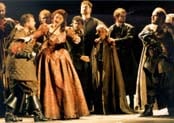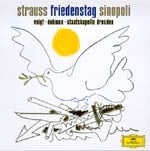OPERA SEARCH

Friedenstag
(Peace Day) (1935-36)Libretto by Joseph Gregor (G,E,F,I)
2S,3T,5Bar,4B; chorus
3(III=picc).2.corA.3.bcl.3.dbn-6.4.4.1-timp.perc:BD/SD/TD/tam-t-
strings(16.16.12.10.8)
On-stage: tpt-perc:glsp-org
Abbreviations (PDF)
Boosey & Hawkes
Nationaltheater, Munich
Conductor: Clemens Krauss
Company: Bavarian State Opera
| COMMANDANT of the beleagured town | Baritone |
| MARIA, his wife | Soprano |
| SERGEANT-MAJOR | Bass |
| CORPORAL | Baritone |
| PRIVATE SOLDIER | Tenor |
| MUSKETEER | Bass |
| BUGLER | Bass |
| OFFICER | Baritone |
| FRONT-LINE OFFICER | Baritone |
| A PIEDMONTESE | Tenor |
| THE HOLSTEINER, commanding the besieging army | Bass |
| MAYOR | Tenor |
| A BISHOP | Baritone |
| Woman | Soprano |
| Soldiers of the garrison and of the besieging army, elders of the town, | chorus |
The citadel of a beleaguered town during the Thirty Years War, 24 October 1648
As the Thirty Years War nears its end, a Roman Catholic German town has been withstanding siege by the Protestant forces from Holstein, defended by a military unit housed in its citadel. The townsfolk are starving and, breaking through the citadel gates, they plead for surrender. The army Commandant will not listen to the mob as his instructions from the Emperor are to hold the town, whatever the cost to human life. Only when he sees his own soldiers support the citizens does he tell the townsfolk to await the signal at midday for the end of the siege. However, his real plan is to blow up the citadel with himself and his troops. He tells his wife Maria to flee, but this reveals to her a newfound tenderness, and she decides to die with him. At the appointed hour a cannon-shot is heard and the Commandant, thinking the long-awaited battle has started, stamps out the fuse so that his soldiers can die fighting. But bells from afar and throughout the town are heard and peace is announced. The enemy troops approach with wreaths on their guns and white flags. They are welcomed into the town and their commander enters the citadel to describe how the armistice was signed. Maria rejoices, but the Commandant suspects a trick and reaches for his sword. Only when Maria interposes, calling on him to celebrate what is even greater than the Emperor, does her husband embrace the Holsteiner, as all praise 'Glorious, everlasting Peace'.
Dramatic

Albert Dohmen/Deborah Voigt/Dresden State Opera Chorus/Staatskapelle Dresden/
Giuseppe Sinopoli
Deutsche Grammophon DG 463 494-2GH
